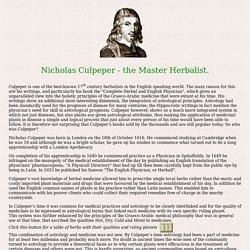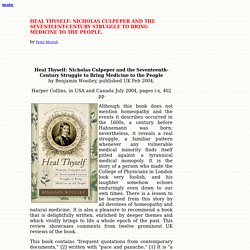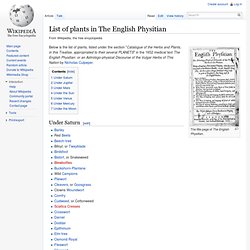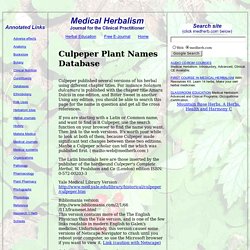

""Culpeper - the Master Herbalist."" Culpeper is one of the best-known 17th century herbalists in the English speaking world.

The main reason for this are his writings, and particularly his book the "Complete Herbal and English Physician", which gives an unparalleled view into the holistic principles of the Graeco-Arabic medicine that were extant at his time. His writings show an additional most interesting dimension, the integration of astrological principles.
Astrology had been standardly used for the prognosis of disease for many centuries; the Hippocratic writings in fact mention the physician’s need for skill in astrological prognosis. Culpeper however, shows us a much more integrated system in which not just diseases, but also plants are given astrological attributes, thus making the application of medicinal plants in disease a simple and logical process that just about every person of his time would have been able to follow. Heal Thyself: Nicholas Culpeper and the Seventeenth-Century Struggle to Bring Medicine to the People - Other Medical Essays - Peter Morrell. Heal Thyself: Nicholas Culpeper and the Seventeenth-Century Struggle to Bring Medicine to the People by Benjamin Woolley, published UK Feb 2004, Harper Collins, in USA and Canada July 2004, pages i-x, 402 pp Although this book does not mention homeopathy and the events it describes occurred in the 1600s, a century before Hahnemann was born; nevertheless, it reveals a real struggle, a familiar pattern whenever any vulnerable medical minority finds itself pitted against a tyrannical medical monopoly.

It is the story of a person who made the College of Physicians in London look very foolish, and his laughter somehow echoes enduringly even down to our own times. There is a lesson to be learned from this story by all devotees of homeopathy and natural medicine. It is also a pleasure to recommend a book that is delightfully written, enriched by deeper themes and which vividly brings to life a whole epoch of the past. Wakehurst Place. One derivation of the name Culpeper connects it to the pepperers, merchants who, in the early Middle Ages, dealt in herbs and other forms of medicinal plants If this is so, then Nicholas Culpeper. the herbalist and best-remembered of all his large family, was aptly named.

But it is due to the continuous popularity of one of his many works, The English Physician, first published in 1652 and now known as Culpeper's Herbal, that his name is naturally associated with herbalism and plant lore. So it seems appropriate that Wakehurst Place, once the home of a main branch of the Culpeper family, is now, through an affiliation with the Royal Botanic Gardens, Kew, an important botanical center containing one of Kew's most valuable collections, a seed bank which represents more than four and a half thousand species of plants.
In 'Wakehurst' two Saxon words are coupled; either 'wic' meaning a dwelling or ‘wak’, which means moist, and 'hyrst', a wood. Early Wakehurst History Continued on next page. Huiles, baumes et fritures de plantes chez Nicolas Culpeper. Ce ne sont pas les livres sur les plantes médicinales qui manquent.

Pour tester leur pertinence, mieux vaut savoir d'où ils tirent leurs informations: compilations, pratique, études sur le terrain… Tous ne le disent pas… Cela me semble particulièrement intéressant si par exemple, on veut se lancer dans des macérations de plantes. Dans l'huile? Dans l'eau? Comment choisir? D'où l'importance de remonter le plus possible aux sources écrites… Si on regarde la compilation qu'est en train de faire Bluetansy sur son site consacré aux huiles infusées, on découvre qu'elle recense pas mal d'auteurs anglo-saxons. Culpeper's English Family Physician; or, Medical herbal enlarged, with several hundred additional plants, principally from Sir John Hill ... and a New Dispensatory, from the MS. of the late Dr. Saunders ... By Joshua Hamilton. With “Culpeper's Astrologica. The English Physician; Enlarged with Three Hund... Culpeper's complete herbal - Google Play. Culpeper's complete herbal : consisting of a co...
Free Online Literature and Study Guides. List of plants in The English Physitian (1652 book) The title page of The English Physitian.

Below is the list of plants, listed under the section "Catalogue of the Herbs and Plants, in this Treatise, appropriated to their several PLANETS" in the 1652 medical text The English Physitian: or an Astrologo-physical Discourse of the Vulgar Herbs of This Nation by Nicholas Culpeper. Under Saturn[edit] Under Jupiter[edit] Under Mars[edit] Under the Sun[edit] Under Venus[edit] Under Mercury[edit] "Culpeper's Medicinal Plant Names" Culpeper's Complete Herbal Alphabetical Index. Culpeper Plant names database. Culpeper published several versions of his herbal using different chapter titles.

For instance Solanum dulcamara is published with the chapter title Amara Dulcis in one edition, and Bitter Sweet in another. Using any edition, you should be able to search this page for the name in question and get all the cross references. If you are starting with a Latin or Common name, and want to find in it Culpeper, use the search function on your browser to find the name you want. Then link to the web versions. It's worth your while to look at both of them, because Culpeper made significant text changes between these two editions.